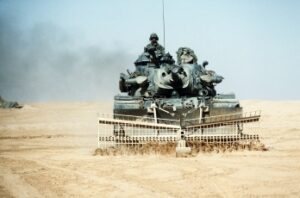
Military personnel operate a combat engineer vehicle with a mine rack during the Gulf War. Source: Wikipedia
SAN FRANCISCO — A disorder related to military service in the 1991 Gulf War (GW), Gulf War illness (GWI)/Chronic Multisymptom Illness (CMI), includes symptoms such as fatigue, pain and cognitive dysfunction. Although anosmia is not a typical GWI/CMI symptom, anecdotally some GW veterans have reported losing their sense of smell shortly after the war, according to a new report in Environmental Health.1
“Because olfactory deficit is a prodromal symptom of neurodegenerative diseases like Parkinson’s and Alzheimer’s disease, and because we previously reported suggestive evidence that deployed GW veterans may be at increased risk for Mild Cognitive Impairment (MCI) and dementia, the current study examined the relationship between olfactory and cognitive function in deployed GW veterans,” wrote author Linda L. Chao, PhD, of the University of California San Francisco and the San Francisco VA Healthcare System.
In the study, 80 deployed GW veterans (mean age: 59.9 ±7.0; 4 female) were tested remotely with the University of Pennsylvania Smell Identification Test (UPSIT) and the Montreal Cognitive Assessment (MoCA). Veterans also filled out questionnaires about their health and deployment-related exposures and experiences. UPSIT and MoCA data from healthy control (HC) participants from the Parkinson’s Progression Markers Initiative (PPMI) study were then used as comparison.
The results indicated that GW veterans had a mean UPSIT score of 27.8 ± 6.3 (range 9-37) and a mean MoCA score of 25.3 ± 2.8 (range 19-30). “According to age- and sex-specific normative data, 31% of GW veterans (vs. 8% PPMI HCs) had UPSIT scores below the 10th percentile,” Chao pointed out. “Nearly half (45%) of GW veterans (vs. 8% PPMI HCs) had MoCA scores below the cutoff for identifying MCI. Among GW veterans, but not PPMI HCs, there was a positive correlation between UPSIT and MoCA scores (Spearman’s ρ = 0.39, p < 0.001).”
She added that there were no significant differences in UPSIT or MoCA scores between GW veterans with and without history of -19 or between those with and without Kansas GWI exclusionary conditions.

Linda L. Chao, PhD, of the University of California, San Francisco and the San Francisco VA Healthcare System.
“We found evidence of olfactory and cognitive deficits and a significant correlation between UPSIT and MoCA scores in a cohort of 80 deployed GW veterans, 99% of whom had CMI,” the study concluded. “Because impaired olfactory function has been associated with increased risk for MCI and dementia, it may be prudent to screen aging, deployed GW veterans with smell identification tests so that hypo- and anosmic veterans can be followed longitudinally and offered targeted neuroprotective therapies as they become available.”
Although anosmia—full or partial loss of the sense of smell—is not one of the more common symptoms of GWI, many veterans have described losing their sense of smell in anecdotal reports. “I’ve been doing research with GW veterans for nearly 20 years. During that time, a few have commented to me in passing that they lost their sense of smell shortly after the war,” Chao advised in a University of California San Francisco press release. “Other GWI researchers confirmed that they’ve also noticed that GW veterans do not have good senses of smell.”
Prior research has suggested the link between impaired olfaction and a higher risk of developing neurodegenerative conditions like Alzheimer’s disease and Parkinson’s disease in the future. The study also noted that damage in those diseases often begins in the olfactory bulb, the brain region involved in smell.
Chao said the findings highlight the importance of including routine smell test screening in monitoring the health of Gulf War veterans. Hypo- and anosmic veterans can then be followed longitudinally and offered targeted neuroprotective therapies as they become available, she said, adding, “I really do believe that it may be worthwhile for the VA to screen and monitor GW veterans with these simple scratch-and-sniff tests.”
- Chao LL. Olfactory and cognitive decrements in 1991 Gulf War veterans with Gulf War illness/chronic multisymptom illness. Environ Health. 2024 Jan 30;23(1):14. doi: 10.1186/s12940-024-01058-2. PMID: 38291474; PMCID: PMC10825982.

